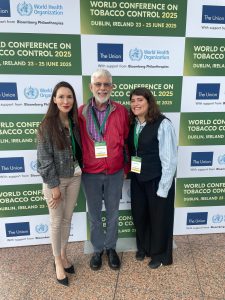The Tobacco Control Unit (UCT) of the Catalan Institute of Oncology has had a prominent participation in the World Conference on Tobacco Control 2025 , held this June in Dublin, Ireland. The event, an international benchmark in the field of tobacco control, has brought together experts, policymakers and activists from around the world to address current and future challenges in the fight against smoking.
In this edition, the event offered an ambitious and transversal program, where emphasis was placed on the application of the World Health Organization Framework Convention on Tobacco Control (FCTC) and the set of MPOWER measures, which aim to support the implementation of effective interventions to reduce tobacco demand. Topics such as the regulation of new nicotine products or the growing influence of the tobacco industry in the formulation of public policies were also addressed. One of the main axes of the congress was the “ENDGAME” strategy, which aims to completely eradicate tobacco consumption in the coming decades. In this context, the Tobacco Control Unit had the opportunity to present two relevant research within the scientific program of the congress:
- Ariadna Feliu presented the results of the study “Differential socio-economic effect of tobacco control policies on smoking prevalence and cessation rates in the European Union (2009–2020)” . The research reveals that current policies have had an unequal impact according to socioeconomic level, and calls for greater equity in public health strategies.
- In electronic poster format, Olena Tigova presented the project “Promotion of smoke-free homes among families with minors in Spain” , an adapted intervention based on evidence that aims to reduce children’s exposure to environmental smoke within the home.
Endgame Summit
Before the official start of the conference, two representatives from the UCT — Dr. Armando Peruga and the Dr. Cristina Martinez— were invited to participate in the prestigious Endgame Summit , organized by the organization Action on Smoking and Health (ASH) , on June 22. The meeting brought together nearly 150 international specialists to discuss decisive strategies with the aim of accelerating the end of the tobacco epidemic. Issues such as legal accountability of the tobacco industry, the key role of civil society and the need for coordinated global action focused much of the discussion.


